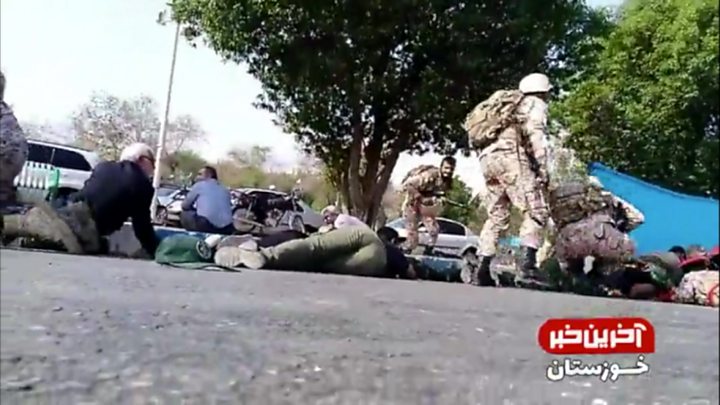
Iranian President Hassan Rouhani has criticised the US following a deadly attack on a military parade.
Gunmen opened fire at Revolutionary Guard troops in the south-western city of Ahvaz on Saturday, in an attack claimed by both an anti-government Arab group, and Islamic State militants.
Mr Rouhani said the "bully" US and the Gulf states it backed had enabled the attack.
Mr Rouhani will face Donald Trump at the UN General Assembly this week.
Saturday's attack killed 25 people, including 12 soldiers, civilians watching the parade, and a four-year-old girl.
Ahvaz National Resistance, an umbrella group that claims to defend the rights of the Arab minority in Iran's Khuzestan Province, said the group was behind the bloodshed, while IS also claimed the attack.
Neither group provided evidence to show they were involved.
Speaking on Sunday, before leaving for the UN in New York, Mr Rouhani vowed that Iran would "not let this crime stand".
"It is absolutely clear to us who committed this crime... and whom they are linked to," he said.
"The small puppet countries in the region are backed by America, and the US is provoking them and giving them the necessary capabilities."
He added that Iran would voice its views on "the global situation" at the UN, adding: "The US showed the world their bullying nature and they keep continuing their unilateral policies."
Why are US-Iran relations so tense?
The two sides have had thorny relations for decades.
The US has accused Iran of running a clandestine nuclear weapons programme, which Iran denies.
In 2015, under then-president Barack Obama, the US and Iran reached a landmark nuclear deal - also signed by China, Russia, the UK, France and Germany - where Iran limited its nuclear activities in exchange for sanctions relief.
However, ties deteriorated after Mr Trump took office and then withdrew from the nuclear deal.
Since then, the US has brought sanctions back into place, despite opposition from EU partners, China and Russia, and warned that anyone trading with Iran would also be punished.
The US has also expressed support for anti-government protesters in Iran.
More generally, the US is deeply suspicious of Iranian activity in the Middle East - including its influence in Syria and Yemen - and is an ally of Israel and Saudi Arabia, two of Iran's opponents.
Mr Trump is chairing a UN Security Council meeting on Wednesday - and says the meeting will be focused on Iran.
Who does Iran blame for the attack?
Iran's Supreme Leader, Ayatollah Khamenei, has accused "regional states that are puppets of the US", while a spokesman for the armed forces said the gunmen were trained by two Gulf Arab states with links to the US and Israel.
Neither of them clarified which "regional states" they were referring to.
Iran has long-standing tensions with Israel - considering it an illegitimate occupier of Muslim land - and has accused it of attempting to undermine the government.
Meanwhile, Iran has previously alleged that its regional rival, Saudi Arabia, supports separatist activity among Iran's Arab minority.
On Sunday, Iran's foreign ministry summoned a United Arab Emirates envoy over comments an unnamed official made about the attack, state TV reported, without giving further details.
Iran also summoned diplomats from the UK, the Netherlands, and Denmark on Saturday, accusing their countries of harbouring Iranian opposition groups.